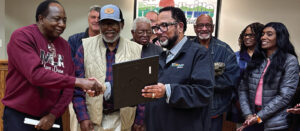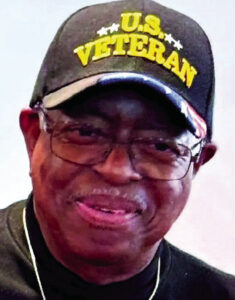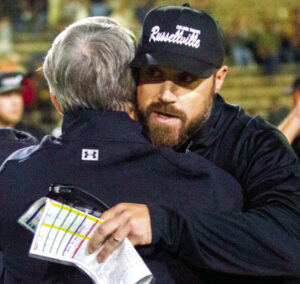Veterans honored at July 4th event
Mayor Troy Oliver, Lt. Col. Grant Atkins, and Rep. Johnny Mack Morrow (far right) applaud after Russellville residents Olen Searcy and Floyd Montgomery were honored for their service in World War II at the Jam on Sloss Lake July 4th celebration.
As Olen Searcy gazed out across the mass of people gathered to celebrate Independence Day at Russellville’s Sloss Lake last Wednesday, the laugh lines on his face widened.
When the crowd clamored to their feet with applause to honor him and fellow veteran Floyd Montgomery, Searcy’s chest swelled with pride and appreciation.
But what he didn’t realize at the time is that the touching story of what he and Montgomery did for their country so many years ago had made each person in the audience swell up with a different pride and appreciation for the two men who risked everything to ensure that America remained the land of the free and the home of the brave.
Searcy, a near-90-year-old World War II veteran and longtime Russellville resident, first entered the U.S. Army on January 12, 1943. A mere seven days later, Searcy began his active duty, and after 19 months of training at various camps and bases, Searcy was deployed into the hostile overseas arena to fight for the freedoms he had held so dear.
After fighting for a month in the midst of the conflict on German soil, Searcy discovered what it meant to give everything for his country.
On September 16, 1944, Searcy’s unit was attempting to push the German troops back to their fortified positions when the Germans surrounded the Allied troops and opened machine gun fire.
Before his unit had time to react to their position right in the crossfire, Searcy was struck by bullets in the back and legs four different times.
Injured and shaken, Searcy looked around but couldn’t determine if any of the rest of his unit had made it through the onslaught of bullets that were raining down around him – something he still doesn’t know to this day.
With four bullet wounds and searing pain, Searcy was unsure of his fate. But as the German troops began to pull back, a German medic found him lying severely injured and alone.
To Searcy’s surprise and relief, the medic had mercy on him and began to treat him through the night. But the next day as American troops opened attack on the German troops that were holding Searcy captive, he suffered more wounds in his legs and head from the shrapnel and debris.
After 24 hours of injuries and uncertainty, the American forces were able to regain their ground and rescue Searcy from enemy hands.
He spent the next 10 months being shipped to field hospitals in France and England before finally arriving back on the familiar and comforting American soil.
Searcy stayed in a hospital in Memphis, Tenn., for a little over a month before he was honorably discharged from the army on August 31, 1945.
For his sacrifices and service, Searcy received the Bronze Battle Star, the Purple Heart and Good Conduct medals; an EAME pin; and European and German campaign ribbons.
While Searcy was enduring the most harrowing experiences of his life, fellow Franklin County son Floyd Montgomery was also discovering just what it took to preserve the freedoms and rights America enjoyed.
Montgomery, who is now 91, began his service with the U.S. Army after being drafted in 1942, and he became a staff sergeant with the 120th Infantry Regiment.
After his 18 months of training were complete, he ended up being stationed in Omaha Beach, France.
On the day of July 27, 1944, Montgomery recalled that he asked a fellow soldier in his platoon if he could borrow his small New Testament Bible to read.
As the sun went down and Montgomery found himself wanting to read further, he asked if he could keep the bible for one more day.
“He told me that I could just keep it, so I put it in my chest pocket of my shirt over my heart,” Montgomery said.
At the time, Montgomery was using the words found inside the bible to comfort him and protect his heart and mind. But he would soon find out that the small bible would ultimately save his life.
Montgomery said that the next morning as he was sitting on the side of a fox hole, a German artillery shell hit the top of a hedgerow where his platoon was stationed, killing three soldiers close to him.
A piece of that shell hit him in the chest, but when he looked down to see how bad the wound was he couldn’t find where it had struck him.
“I felt the push from the impact of that piece of shell and I saw the hole it left in my field jacket,” Montgomery said, “but when I started feeling around to find the blood, there was nothing there.”
He said he saw that the shell had went through his jacket, his wallet and had pierced the bible he had placed in his pocket only hours earlier.
“That piece of shell was a half inch by and inch and it just rolled out in my hand,” he said. “The testament had stopped it and I have no doubt that testament saved my life.
“After that, I said I would read a verse a day until I finished it, and I did.”
After escaping one close call with death, Montgomery ended up being moved to Germany, where he would face one of the most daunting tasks during his time in the service.
On February 23, 1945, Montgomery’s company had just crossed the Roer River when they went through thick undergrowth and into wooded area that was laced with mines and traps that took the lives of many soldiers.
“This was sometime around 2 a.m. and there were wires running from each bobby trap that were hard to see,” he said. “If you touched the wire or tried to cut it, it would explode.”
After Montgomery’s platoon leader and platoon sergeant were killed by one of the traps, Montgomery knew someone had to take command of the troops, so he made the decision to lead them best he could to safety.
“I knew that if somebody didn’t lead the men forward, we would have to go back to the river and start all over,” he said. “I didn’t want to have to go through those traps again so I knew what I had to do.”
After reorganizing the 16 soldiers who were now in his command, Montgomery led his men through heavy enemy fire. He disregarded his own personal safety and in doing so, his bravery in the face of adversity inspired his troops to make it across the exposed terrain and seize the place they had been assigned to capture.
Montgomery spent some time in hospitals overseas were he was treated for war-related injuries and complications and was honorably discharged from service in September of 1945.
For his efforts in that conflict, Montgomery received two Purple Hearts, a Bronze Star and five Battle Stars. He also received the Silver Star Medal, but many years later, the medal was misplaced and Montgomery was left without the physical reminder of what he did for his country during World War II.
Russellville Mayor Troy Oliver, who is a member of the local chapter of the Veterans of Foreign Wars along with Montgomery, said he knew about the misplaced medal and thought it was only right that Montgomery receive a replacement.
“This man served bravely during the war and I thought he deserved to have his Silver Star replaced,” Oliver said, “so when I found out that I would be able to get him another one, I wanted to make the presentation special.”
Oliver said he decided to present the replacement medal to Montgomery and also honor his longtime friend, Searcy, at this year’s July 4th celebration because it was a good time to let the community know that there were heroes among them.
“I know there are many people that know about what these two men did during the service, but I know there are many people who don’t and I think it’s something everyone should be aware of,” Oliver said. “If the veterans of World War II hadn’t done what the did in Europe and the Pacific, there is no doubt in my mind that we wouldn’t have the America we have today with all our freedoms.”
Oliver presented Montgomery with his Silver Star Medal and he presented Searcy the Alabama Legislature Medal of Honor, which recognizes wounded warriors, disabled veterans and family members of those who lost their lives in service to their country.
Searcy said he was overwhelmed by the ceremony and appreciative of the recognition, but he only did what was expected of him.
“I was just doing my duty for my country,” Searcy said. “I didn’t think about what I was doing as being heroic.”
Montgomery agreed.
“If I had it to do over again, I’d do the exact same thing,” Montgomery said. “I knew what needed to be done for my men to get the job done, so that’s just what I did.”







